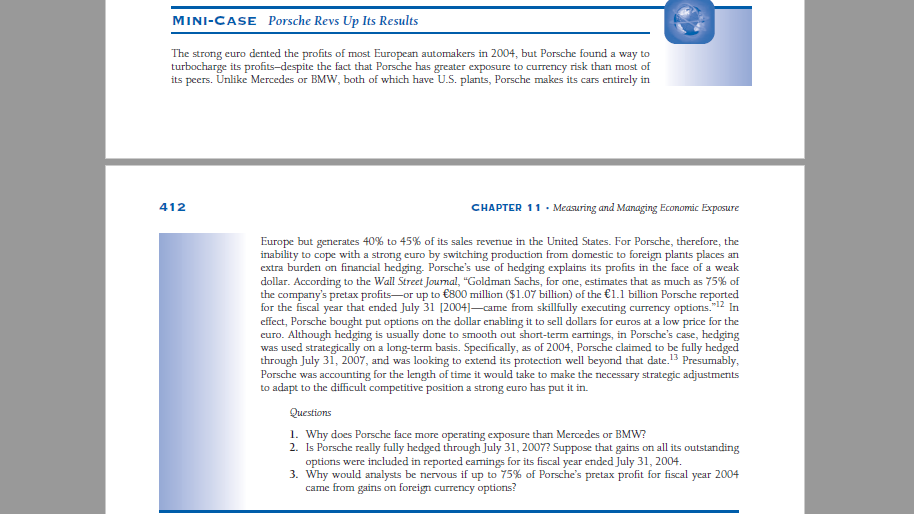Question
MINI-CASE Porsche Revs Up Its Results The strong euro dented the profits of most European automakers in 2004, but Porsche found a way to turbocharge

MINI-CASE Porsche Revs Up Its Results
The strong euro dented the profits of most European automakers in 2004, but Porsche found a way to turbocharge its profits-despite the fact that Porsche has greater exposure to currency risk than most of its peers. Unlike Mercedes or BMW, both of which have U.S. plants, Porsche makes its cars entirely in CHAPTER 11 Measuring and Managing Economic Exposure Europe but generates 40% to 45% of its sales revenue in the United States. For Porsche, therefore, the inability to cope with a strong euro by switching production from domestic to foreign plants places an extra burden on financial hedging, Porsche's use of hedging explains its profits in the face of a weak dollar. According to the Wall Street Journal, "Goldman Sachs, for one, estimates that as much as 75% of the company's pretax profitsor up to 800 million ($1.07 billion) of the 1.1 billion Porsche reported for the fiscal year that ended July 31 [2004]came from skillfully executing currency options."12 In effect, Porsche bought put options on the dollar enabling it to sell dollars for euros at a low price for the euro. Although hedging is usually done to smooth out short-term earnings, in Porsche's case, hedging was used strategically on a long-term basis. Specifically, as of 2004, Porsche claimed to be fully hedged through July 31, 2007, and was looking to extend its protection well beyond that date. Presumably, Porsche was accounting for the length of time it would take to make the necessary strategic adjustments to adapt to the difficult competitive position a strong euro has put it in
Questions
1. Why does Porsche face more operating exposure than Mercedes or BMW?
2. Is Porsche really fully hedged through July 31, 2007? Suppose that gains on all its outstanding options were included in reported earnings for its fiscal year ended July 31, 2004.
3. Why would analysts be nervous if up to 75% of Porsche's pretax profit for fiscal year 2004 came from gains on foreign currency options?
MINI-CASE Porsche Revs Up Its Results The strong euro dented the profits of most European automakers in 2004, but Porsche found a way to turbocharge its profits-despite the fact that Porsche has greater exposure to currency risk than most of its peers. Unlike Mercedes or BMW, both of which have U.S. plants, Porsche makes its cars entirely in CHAPTER 11 Measuring and Managing Economic Exposure Europe but generates 40% to 45% of its sales revenue in the United States. For Porsche, therefore, the inability to cope with a strong euro by switching production from domestic to foreign plants places an extra burden on financial hedging, Porsche's use of hedging explains its profits in the face of a weak dollar. According to the Wall Street Journal, "Goldman Sachs, for one, estimates that as much as 75% of the company's pretax profitsor up to 800 million ($1.07 billion) of the 1.1 billion Porsche reported for the fiscal year that ended July 31 [2004]came from skillfully executing currency options."12 In effect, Porsche bought put options on the dollar enabling it to sell dollars for euros at a low price for the euro. Although hedging is usually done to smooth out short-term earnings, in Porsche's case, hedging was used strategically on a long-term basis. Specifically, as of 2004, Porsche claimed to be fully hedged through July 31, 2007, and was looking to extend its protection well beyond that date. Presumably, Porsche was accounting for the length of time it would take to make the necessary strategic adjustments to adapt to the difficult competitive position a strong euro has put it in Questions 1. Why does Porsche face more operating exposure than Mercedes or BMW? 2. Is Porsche really fully hedged through July 31, 2007? Suppose that gains on all its outstanding options were included in reported earnings for its fiscal year ended July 31, 2004. 3. Why would analysts be nervous if up to 75% of Porsche's pretax profit for fiscal year 2004 came from gains on foreign currency optionsStep by Step Solution
There are 3 Steps involved in it
Step: 1

Get Instant Access to Expert-Tailored Solutions
See step-by-step solutions with expert insights and AI powered tools for academic success
Step: 2

Step: 3

Ace Your Homework with AI
Get the answers you need in no time with our AI-driven, step-by-step assistance
Get Started


